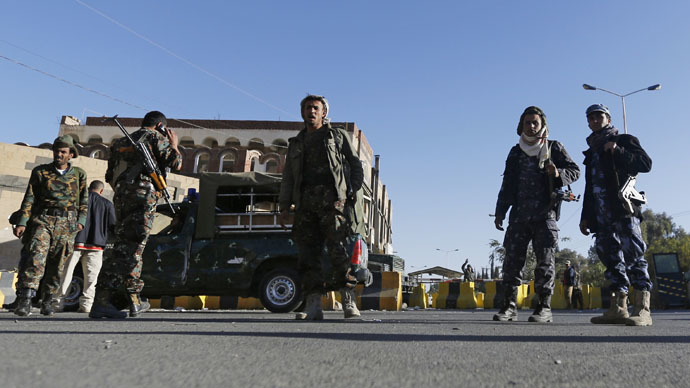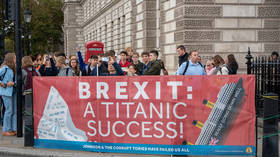‘Leave immediately’: US, Britain evacuate Yemen embassies

Britain and the US have been forced to close their embassies in Yemen, where security hit a new low after Shiite militants took over much of the country. France has likewise announced a diplomatic withdrawal in the coming days.
As the embassy closures were announced, France joined the list, announcing a closure for February 13, also on security grounds.
Both the US and UK embassies evacuated their staff within hours of each other, although a gradual personnel pull-out has been on the cards since January, according to State Department spokeswoman Jen Psaki. However, she declined to comment further on the process.
U.S. suspends embassy operations in Sana'a. http://t.co/ugj0D7T4hj | Information for U.S. citizens in #Yemen: http://t.co/OTAt6XcfqA
— Department of State (@StateDept) February 11, 2015
The British cite “increased risk” to their staff in Yemen. The Foreign Office says it “therefore decided to withdraw diplomatic staff and temporarily suspend the operations of the British Embassy in Sanaa.”
"Our ambassador and diplomatic staff have left Yemen this morning and will return to the UK,” Minister for the Middle East Tobias Ellwood added in the statement. He urged all British citizens still on Yemeni soil to “leave immediately.”
A similar warning was issued to Americans.
Both appear to be pulling out indefinitely, or “until further notice,” a process that began on Tuesday night.
Psaki told journalists that the US "will explore options for a return to Sanaa when the situation on the ground improves."
Only the American forces providing security and fighting terrorism elsewhere in the country will remain, everyone in the capital will go, according to two US officials speaking to the AP on condition of anonymity.
#Yemen: British Embassy Sana'a operations temporarily suspended and staff withdrawn on security grounds http://t.co/E7aGmmQvpJ@ukinyemen
— Foreign Office (FCO) (@foreignoffice) February 11, 2015
Officials are not certain how these developments will affect the wider counter-terrorism efforts against a fierce Al-Qaeda faction in Yemen. Although the US will continue its fight on that front, the Obama administration’s efforts may be harmed as they were largely based on cooperation with the former president.
US intelligence officials say CIA operations may also suffer – this will primarily affect those that were run from the embassy. The US reliance on drones has rendered such tasks difficult, as a rebel faction that has made progress in capturing large swaths of the country has also seized vital installations on the ground, which provided intelligence.
READ MORE: US lacks intelligence to continue waging indiscriminate drone warfare in Yemen

The training of Yemeni forces by American ones will continue, however, according to the Pentagon.
"As I stand here today, we continue to conduct some training. We continue to have the capability – unilaterally if need be – of conducting counter-terrorism operations inside Yemen,” Rear Admiral John Kirby said in a statement, acknowledging the heightened risk of operating in the country.
The Americans offered to help the British evacuate their staff, if needed. The USS Iwo Jima, an amphibious assault ship, is stationed in the Red Sea just off the Yemeni coast.
The countries had been in contact with the leader of the Shiite Houthi rebels, who seized large parts of Yemen last month. But Abdul-Malik al-Houthi failed to convince the British that their staff would be protected. He also warned his adversaries on Tuesday that the movement “will not accept pressures. They are of no use. Whoever harms the interest of this country could see that their interest in this country are also harmed.”
READ MORE: Gulf States accuse Yemen Houthis of staging coup
This new low follows a breakdown in talks last week, as the United Nations tried to get the Houthis to sit down with other Yemeni elements, after the former dissolved parliament and forced President Abed Rabbo Mansour Hadi to resign under threat of force. He is now under house arrest.
The other parties were meant to sign a draft constitution to end the crisis, something the Houthis did not want.
The faction originates in northern Yemen and borders Saudi Arabia, the world’s second-largest oil producer. They took Sanaa in September and have since expanded their influence. The Houthis are also thought to be linked to regional Shiite powers, something the militants have denied.












